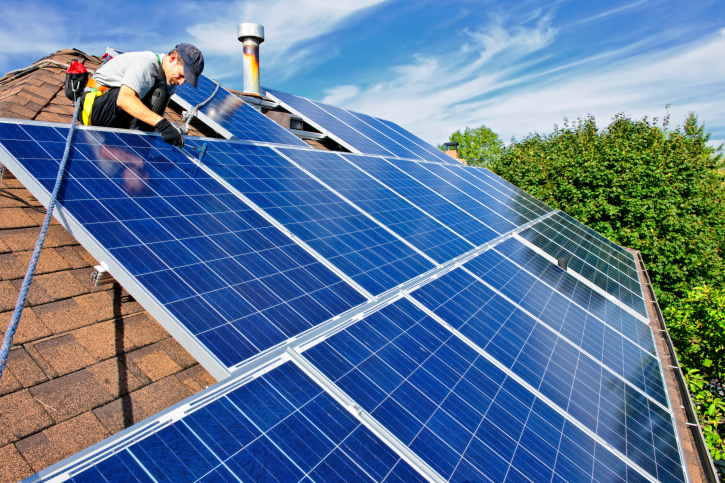Florida residents who install rooftop solar arrays could find their house insurance policies cancelled by their insurer.
Some insurers steer clear of covering homes with rooftop solar altogether, while others have specific guidelines and standards for how much they will cover. Factors considered can include, for instance, the size of the solar array, type of rooftop, and other factors.
According to the South Florida Sun Sentinel, Florida homeowners are finding a growing number of insurance companies’ are reluctant to cover homes with rooftop solar systems. Homeowners are increasingly receiving policy cancellation notices in the mail after their insurer discovers they have installed rooftop solar systems.
Hurricanes, Other Complications
Securing homeowners’ insurance in Florida is complicated by the heighted risk of hurricanes in the state, says Sal Nuzzo, vice president of policy at the Florida-based James Madison Institute.
“Florida has had a myriad of challenges over the years with regard to property insurance,” Nuzzo said. “Part is geographic—we have more coastal risk then all other Gulf Coast states combined. Part is climate—we are a peninsula jutting out into hurricane alley.”
Florida is among the states that allow special deductible charges for damage associated with hurricane strikes, which can exceed 10 percent in some cases.
The state also has a unique hurricane related insurance deductible called a “single season hurricane deductible,” where homeowners pay for just one hurricane deductible if their home is hit multiple times in a single season. Generally, homeowners need to pay for both wind and flood insurance if they live in hurricane-prone regions, because regular homeowners insurance doesn’t cover hurricane damage.
Rooftop solar complicates matters further, says Nuzzo, because it often requires drilling holes in the roof, making insurers reluctant to cover homes that may then be more susceptible to weather-related damages.
‘Out of Control Litigation’
Even before government policies started encouraging the installation of rooftop solar panels on homes, Florida had serious problems with homeowners’ insurance litigation that jeopardizes the ability and willingness of insurers to operate in the state, says Nuzzo.
“A huge part of Florida’s homeowners’ insurance problem is our out-of-control litigation environment, said Nuzzo. “Florida has 7 percent of the U.S. population, and 8 percent of all the homeowners insurance claims, but 80 percent of all homeowners’ litigation. This is a direct result of the ability of nefarious trial attorneys to manipulate Florida’s legal system and cost every homeowner in the state.”
Personal Liability Coverage Required
Florida law requires homeowners with rooftop installations above 10 kilowatts to carry a $1 million personal liability policy, due to concerns about potential danger to the grid and electric line workers. Combined with the state’s litigation environment, liability concerns are making insurers hesitant to cover homes where residents have added rooftop solar systems. As some insurers drop coverage for such homes, insurers that offer such policies are raising their rates, making insurance less affordable.
Deceived by ‘Solar Scam’
Those installing roof-top solar systems on their homes have been misled in a number of ways, says Tim Benson, a senior policy analyst at The Heartland Institute.
“They’ve been told they’re going to simultaneously have cheaper bills and help the planet if they get solar panels installed on their home, and it doesn’t hurt that it comes with a big, fat 30 percent tax credit courtesy of Uncle Sam,” said Benson. “However, not checking with their insurance agent first on a major home project like that to find out what would be the result is completely on them.”
Beach access also affects the price and availability of homeowners insurance, says Benson.
“They also aren’t the only people in Florida dealing with cancelled policies or increased premiums,” said Benson. “Just about everybody who lives within walking distance of the ocean down here is finding it harder and harder to get a company to insure them, and if they do, the premiums are getting to be ridiculous.”
Net Metering: ‘Glorified Welfare’
Florida homeowners should examine the experience of those who have already had problems with their rooftop solar systems before jumping on board the “solar scam” that is raising the costs of living for all Floridians, says Benson.
“On a dollar-per-unit-of-electricity-produced basis, solar is by far the most expensive energy source and net metering programs are nothing more than glorified welfare programs for the upper-middle class,” Benson said. “Net metering causes a re-allocation of transmission, distribution, and reliability costs to those utility customers who do not own solar panels and such cost-shifting impedes social equity, because rooftop solar owners generally have higher incomes than others, so lower-income ratepayers end up paying extra to subsidize higher-income customers.”
Net-metering reform passed both houses of the Florida Legislature earlier this year, but was ultimately vetoed by Gov. Ron DeSantis. This means that the utility customers who have rooftop solar—who do not pay their full share of grid maintenance costs, due to Florida’s net metering laws—will continue to be subsidized by regular ratepayers.
Linnea Lueken (llueken@heartland.org) is a research fellow with the Arthur B. Robinson Center on Climate and Environmental Policy at The Heartland Institute.
For more on rooftop solar, click here and here.
For more on Florida environmental policy click here and here.
